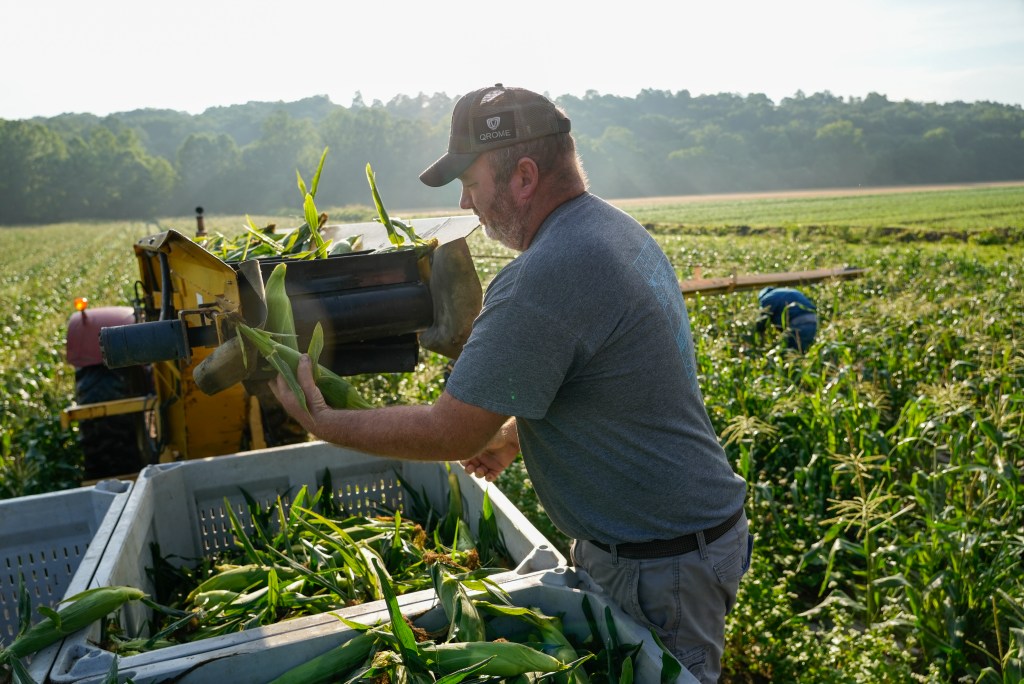After a slow start to planting this spring, Illinois’ most important cash crops have taken off. Corn is standing tall across the Midwest grain belt. Soybeans are doing even better, with ideal conditions for growing their little green pods.
On Aug. 12, the U.S. Agriculture Department unveiled its most significant crop report of the year, projecting a bin-busting soybean harvest of 4.6 billion bushels, which would easily set a record. Corn is projected at 15.1 billion bushels, the third biggest haul ever, coming on top of a similarly enormous crop last year.
With little fanfare, America’s farmers are feeding a hungry world. At the same time, Congress is letting them down.
Negotiations for a new Farm Bill have stalled — again. And while this page can find plenty to criticize in the sprawling legislation governing farm and food policy, the reality is that America needs a new one, and needs it now. As it stands, a huge chunk of the federal budget covering everything from crop subsidies and food stamps to conservation practices is based on the now-obsolete plan set forth in the 2018 Farm Bill.
Instead of updating that five-year bill as it expired last fall, a hyperpartisan Congress renewed it for a year, supposedly buying time to work out details. That one-year renewal expires next month, and guess what? No new Farm Bill is even close to being approved. Congress is preparing to kick the can down the road again, at least until after the Nov. 5 election and probably well beyond it.
That commits the federal government to continue shelling out more than $100 billion a year on increasingly out-of-date programs. It’s an infuriating waste of taxpayer money, and a missed opportunity to bring about badly needed reforms.
Consider everything that has happened since the end of 2018, when the last Farm Bill became law. A pandemic shut down the country, changing everyday eating habits. Russia invaded Ukraine, devastating one of the world’s biggest breadbaskets.
Climate change brought on harsher weather, wildfires and changes in growing conditions that affect everything from the timing of harvests to the proliferation of pests. Budget-busting disaster payments that were supposed to be reduced thanks to generous subsidies in the 2018 Farm Bill have continued instead.
At the same time, prices have shot up for food, as well as seed, fertilizer, labor, equipment and practically every other important farm input. That unwelcome burst of inflation has raised the cost of programs in the 2018 bill.
In many ways, the bill itself was an exercise in kicking the can down the road, as it enacted only a few modest reforms to the biggest budget items. The 2018 legislation put in place work requirements for food stamps that turned out to be laughably weak. Subsidies that flowed to the wealthiest farmers and landowners continued to badly distort a marketplace awash in high-fructose corn syrup and ethanol motor fuel.
This page has previously pointed out some of the most egregious sins of the 2018 bill that Congress has left to fester. The sugar-subsidy program benefits a small cartel of rich producers at the expense of every American consumer, raising the cost of producing anything with sugar in the U.S. It has badly damaged Chicago’s century-old status as a leading center of U.S. candy making. It needs to go.
The 2018 bill also authorized the mass production of hemp, a variety of cannabis that contains only a tiny amount of THC, the ingredient that gets people high. Entrepreneurs quickly figured out how to make concentrated hemp products, so the bill in effect legalized a form of marijuana nationwide, undermining state laws from coast to coast.
Another costly error of that era was removing restrictions on using the USDA’s Commodity Credit Corp. as a slush fund that ex-President Donald Trump then tapped to pay tens of billions to farmers hurt by his idiotic trade war with China. President Joe Biden proceeded to abuse the same slush fund for climate initiatives and other priorities of his administration. That loophole must be closed.
So far, Congress has accomplished practically nothing. The House GOP deserves credit for at least getting a new Farm Bill out of committee, including a few votes from Democrats. But the Congressional Budget Office recently determined the bill would add billions to the federal deficit, which means a chunk of the House GOP won’t support it anymore. The Democratic-controlled Senate, meantime, aggressively attacked the House bill but hasn’t yet produced one of its own.
As inspiring as it is to drive through farm country and see healthy crops for miles around, one side effect is lower prices, as supplies of corn and soybeans increase. That will translate into lower incomes for Midwest farmers who up to now have enjoyed prosperous times in recent years.
Early signs of economic problems in farm country abound. Moline-based farm equipment-maker Deere & Co. has announced mass layoffs this year, as well as plans to move part of its manufacturing from the Midwest to Mexico in search of lower costs. Some farmers who are watching their crops grow tall while their profits shrink may have trouble getting the loans they need to plant again next year as the cost of production keeps rising.
Let’s go, Congress. Put partisanship aside, scrap the 2018 Farm Bill once and for all, and take some bold steps to put America’s farm and food economy on the right track for the future.
Submit a letter, of no more than 400 words, to the editor here or email [email protected].


